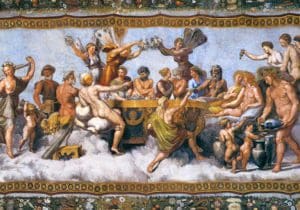
La felicità è un’emozione positiva, sicuramente una delle più appaganti, ed è lo stato d’animo che si manifesta nei momenti di maggiore soddisfazione. Essa è legata a fattori esterni e ambientali, ma in parte dipende anche da noi.
Essere felici non è semplice e purtroppo non esiste una ricetta della felicità che possa ritenersi valida per tutti. In tanti han provato a descriverla e a spiegare un metodo per raggiungerla. Ecco una raccolta delle migliori frasi di scrittori, filosofi, religiosi, personaggi storici e personaggi dello spettacolo sulla felicità (in inglese e italiano).
Aforismi, citazioni e frasi sulla felicità in inglese (con traduzione)
- Think of all the beauty still left around you and be happy.
Pensa a tutta la bellezza ancora intorno a te e sii felice.
(Anna Frank) 
- Happiness is not something ready made. It comes from your own actions.
La felicità non è qualcosa di pronto. Viene dalle tue stesse azioni.
(Dalai Lama) - Freely exercise one’s genius, here is the real happiness.
Esercitare liberamente il proprio ingegno, ecco la vera felicità.
(Aristotele) - How bitter a thing it is to look into happiness through another man’s eyes.
Com’è amaro guardare la felicità attraverso gli occhi di un altro.
(William Shakespeare) 
- Living for others is not only the law of duty, it is also the law of happiness.
Vivere per gli altri, non è soltanto la legge del dovere, è anche la legge della felicità.
(Auguste Comte) - Happiness is when what you think, what you say, and what you do are in harmony.
La felicità è quando ciò che pensi, ciò che dici e ciò che fai sono in armonia.
(Mahatma Gandhi) 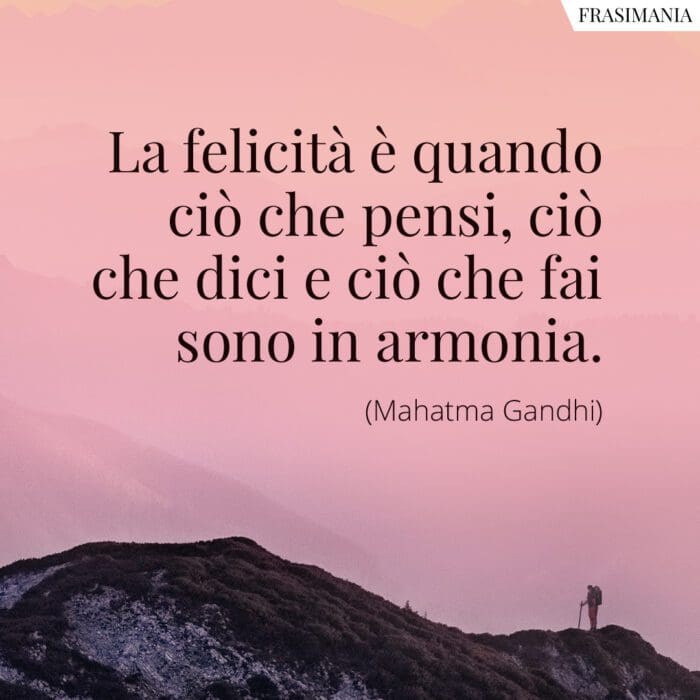
- Action may not always bring happiness, but there is no happiness without action.
L’azione non sempre porta felicità, ma non c’è felicità senza azione.
(Benjamin Disraeli) - Happiness: an agreeable sensation arising from contemplating the misery of another.
Felicità: una gradevole sensazione scaturita dalla contemplazione della sofferenza altrui.
(Ambrose Bierce) - Do you want to be happy? First learn to suffer.
Vuoi essere felice? Impara prima a soffrire.
(Ivan Sergeevič Turgenev) 
- What is pleasure if not an extraordinarily sweet pain?
Che cos’è il piacere se non un dolore straordinariamente dolce?
(Heinrich Heine) - To be content with little is hard. To be content with much, impossible.
Accontentarsi di poco è difficile. Accontentarsi di molto, impossibile.
(Marie von Ebner-Eschenbach) - There is only one happiness in this life, to love and be loved.
C’è solo una felicità nella vita: amare ed essere amati.
(George Sand) 
- How much better is it to weep at joy than to joy at weeping?
Quanto è meglio piangere di gioia che gioire del piangere?
(William Shakespeare) - Happiness is not an ideal of reason, but of imagination.
La felicità non è un ideale della ragione, ma dell’immaginazione.
(Immanuel Kant) - Be happy for this moment. This moment is your life.
Sii felice per questo momento. Questo momento è la tua vita.
(Omar Khayyam) 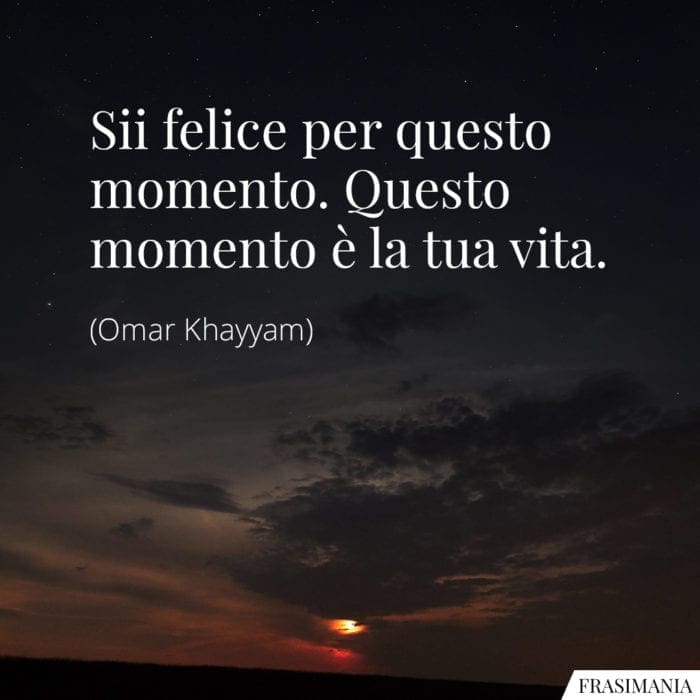
- Some days are just bad days, that’s all. You have to experience sadness to know happiness, and I remind myself that not every day is going to be a good day, that’s just the way it is!
Alcuni giorni sono solo brutti giorni, tutto qui. Devi provare tristezza per conoscere la felicità, e mi ricordo che non tutti i giorni saranno una buona giornata, è proprio così!
(Dita Von Teese) - Where fear is, happiness is not.
Dove c’è paura, non c’è felicità.
(Lucio Anneo Seneca) - We should try to be happy, just to set an example.
Dovremmo cercare di essere felici, se non altro per dare l’esempio.
(Jacques Prévert) 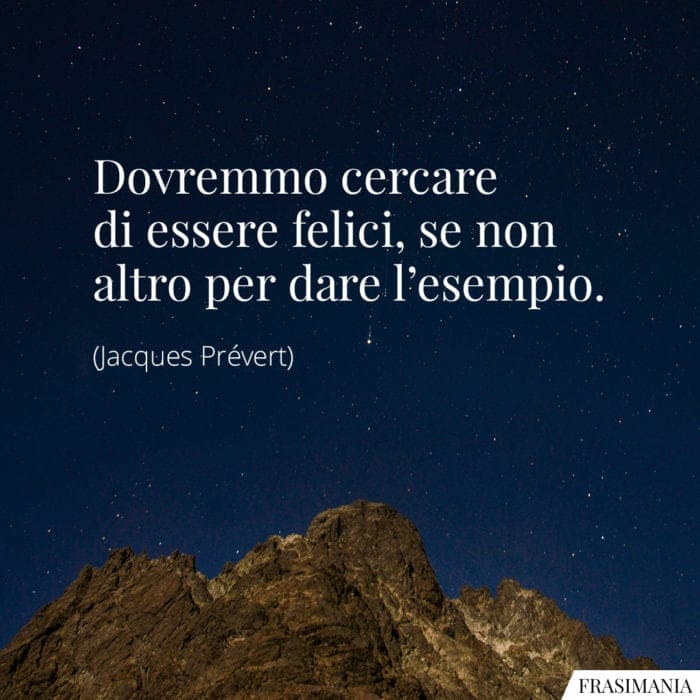
- Happiness often comes from attention in small things.
La felicità viene spesso dalle attenzioni nelle piccole cose.
(Wilhelm Busch) - Every day is a new day, and you’ll never be able to find happiness if you don’t move on.
Ogni giorno è un nuovo giorno e non sarai mai in grado di trovare la felicità se non vai avanti.
(Carrie Underwood) - True happiness costs little; if expensive, it isn’t of good quality.
La vera felicità costa poco. Se è cara, non è di buona qualità.
(François-René de Chateaubriand) 
- To enjoy good health, to bring true happiness to one’s family, to bring peace to all, one must first discipline and control one’s own mind. If a man can control his mind he can find the way to Enlightenment, and all wisdom and virtue will naturally come to him.
Per godere di buona salute, per portare la vera felicità alla propria famiglia, per portare pace a tutti, bisogna prima disciplinare e controllare la propria mente. Se un uomo può controllare la sua mente, può trovare la via per l’Illuminazione, e tutta la saggezza e la virtù verranno naturalmente da lui.
(Buddha) - The secret of happiness is freedom. The secret of freedom is courage.
Il segreto della felicità è la libertà. Il segreto della libertà è il coraggio.
(Tucidide) 
- To be happy, we must not be too concerned with others.
Per essere felici, non dobbiamo preoccuparci troppo degli altri.
(Albert Camus) - Happiness quite unshared can scarcely be called happiness; it has no taste.
La felicità non condivisa può a malapena essere chiamata felicità. Non ha gusto.
(Charlotte Brontë) 
- Just do what must be done. This may not be happiness, but it is greatness.
Fai solo ciò che deve essere fatto. Questo potrebbe non essere la felicità, ma è la grandezza.
(George Bernard Shaw) - Happiness is like a butterfly which, when pursued, is always beyond our grasp, but, if you will sit down quietly, may alight upon you.
La felicità è come una farfalla: se la inseguite, difficilmente riuscirete a prenderla. Ma se vi sedete tranquillamente, potrebbe posarsi su di voi.
(Nathaniel Hawthorne) - Happiness is not having what you want. It’s wanting what you have.
La felicità non è avere quello che si desidera, ma desiderare quello che si ha.
(Oscar Wilde) 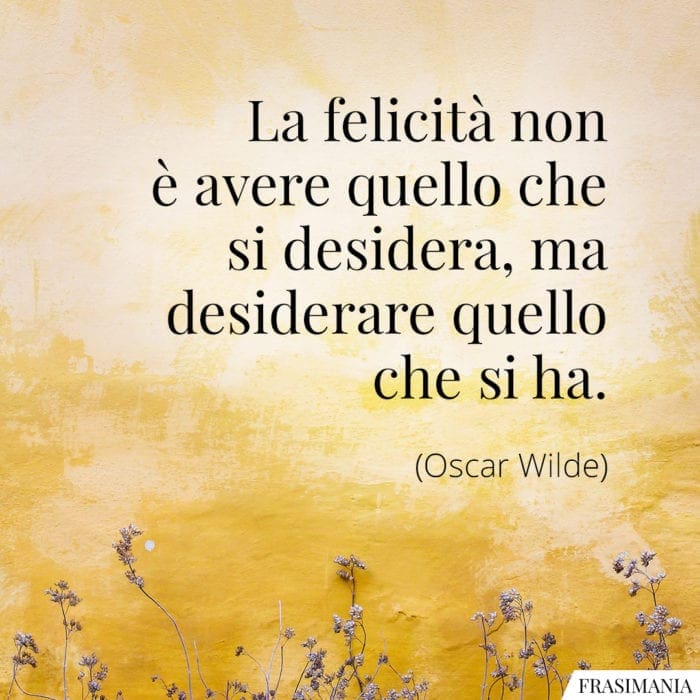
- Happiness lies in the joy of achievement and the thrill of creative effort.
La felicità sta nella gioia del successo e nel brivido dello sforzo creativo.
(Franklin Roosevelt) - Happiness is to know your limits and be happy with them.
La felicità sta nel conoscere i propri limiti e nell’amarli.
(Romain Rolland) 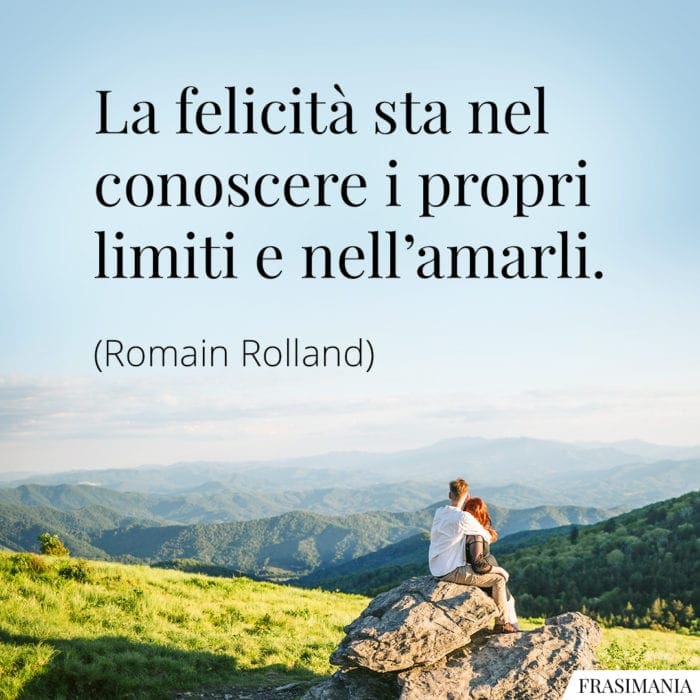
- Being happy doesn’t mean that everything is perfect. It means that you’ve decided to look beyond the imperfections.
Essere felici non significa che tutto sia perfetto. Significa che hai deciso di guardare oltre le imperfezioni.
(Anonimo) - You must be the best judge of your own happiness.
Siate i miglior giudici della vostra stessa felicità.
(Jane Austen) 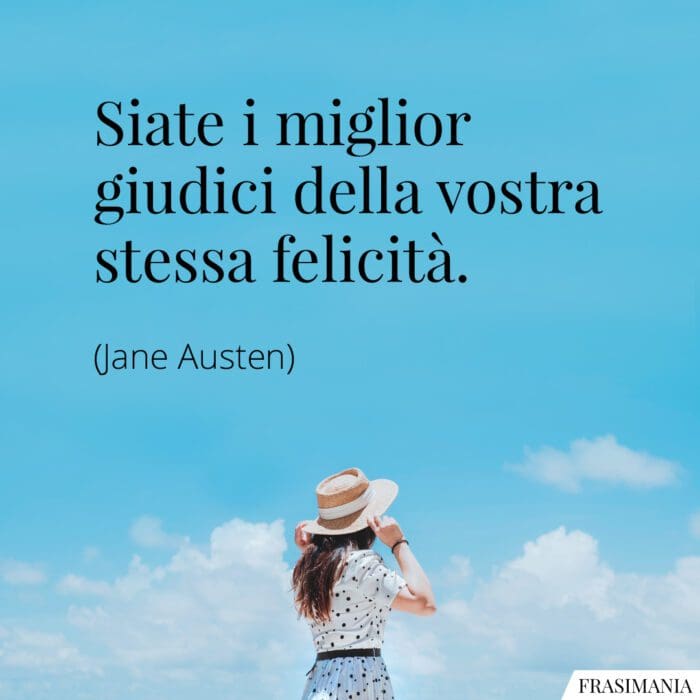
- If one were to build the house of happiness, the largest space would be the waiting room.
Se si costruisse la casa della felicità, la stanza più grande sarebbe la sala d’attesa.
(Jules Renard) - I would always rather be happy than dignified.
Preferisco essere felice che dignitosa.
(Charlotte Brontë) 
- True happiness comes from a sense of inner peace and contentment, which in turn must be achieved through the cultivation of altruism, of love and compassion and elimination of ignorance, selfishness and greed.
La vera felicità proviene da un senso di pace ed appagamento interiore che a sua volta si ottiene coltivando altruismo, amore, compassione, e grazie all’eliminazione di rancore, egoismo e avidità.
(Dalai Lama) - The best revenge is happiness. Nothing drives people more crazy than seeing you happy.
La miglior vendetta? La felicità. Non c’è niente che faccia più impazzire la gente che vederti felice.
(Alda Merini) 
- Good can be achieved amongst human beings who are prepared to trust, prepared to believe in the goodness of people.
La felicità può essere raggiunta tra gli esseri umani che sono pronti a fidarsi, a credere nella bontà delle altre persone.
(Nelson Mandela) - All who joy would win must share it. Happiness was born a twin.
Tutti coloro che conquisteranno la gioia dovranno dividerla. La felicità è nata gemella.
(George Gordon Byron) 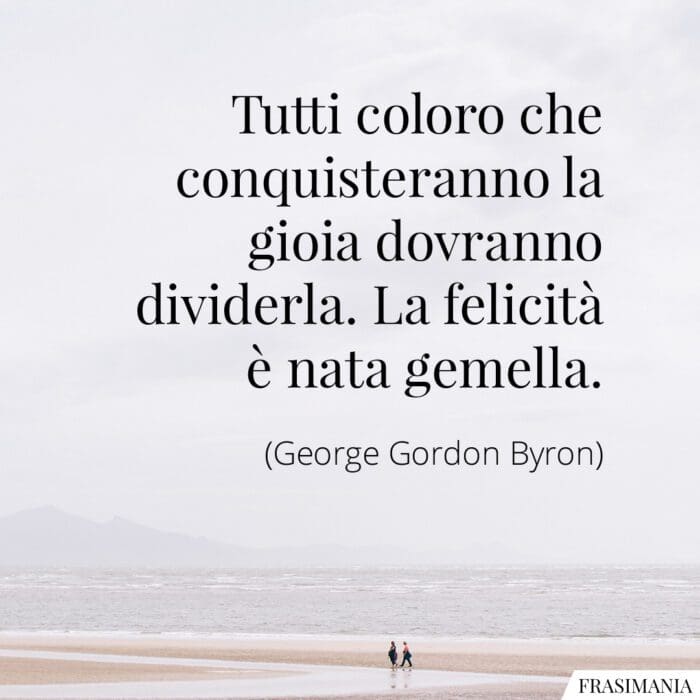
- The most simple things can bring the most happiness.
Le cose più semplici possono portare la più grande felicità.
(Izabella Scorupco) - Happiness is nothing more than good health and a bad memory.
La felicità non è altro che avere una salute di ferro e una memoria corta.
(Albert Schweitzer) 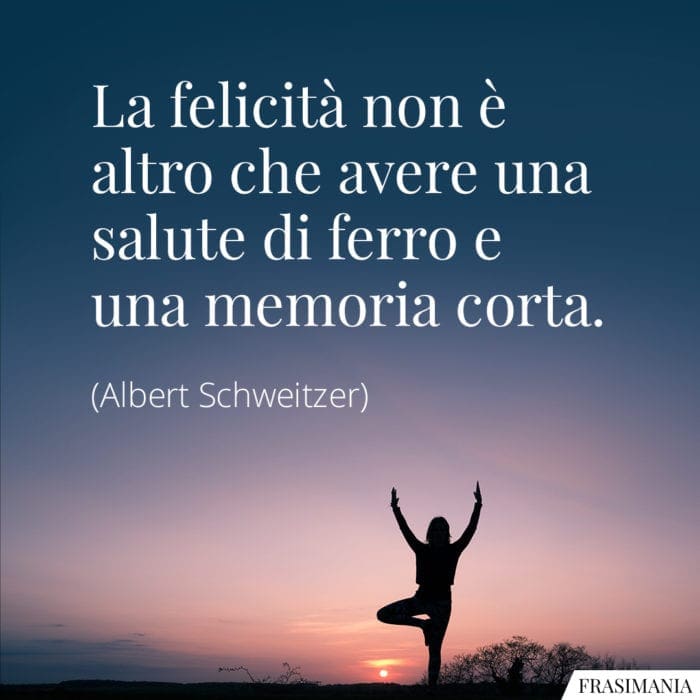
- We don’t even ask happiness, just a little less pain.
Non dobbiamo nemmeno chiedere la felicità, solo un po’ meno di dolore.
(Charles Bukowski) - To find out what one is fitted to do, and to secure an opportunity to do it, is the key to happiness.
La chiave della felicità è scoprire che cosa una persona è adatta a fare e darle l’opportunità di farlo.
(John Dewey) - The foolish man seeks happiness in the distance; the wise grows it under his feet.
Lo sciocco cerca la felicità lontano, il saggio la fa crescere sotto i suoi piedi.
(James Oppenheim) 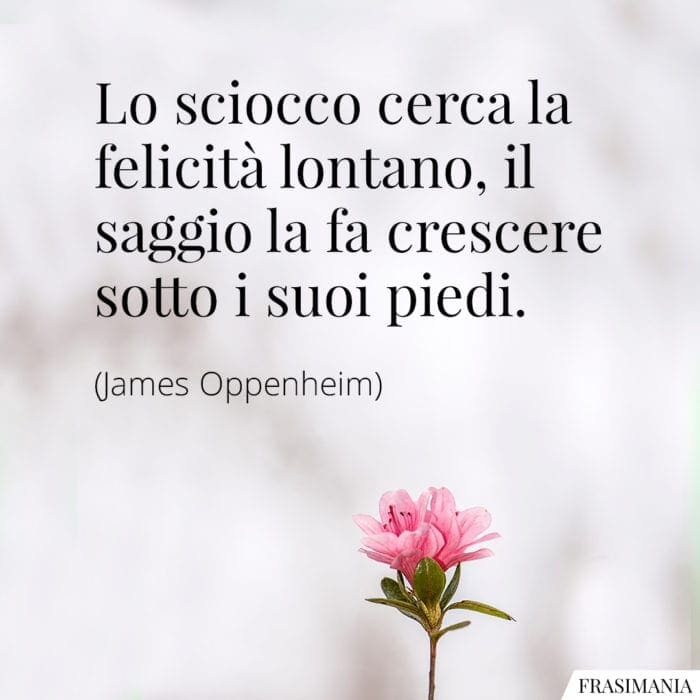
- There is no happiness without knowledge. But knowledge of happiness is unhappy; for knowing ourselves happy is knowing ourselves passing through happiness, and having to, immediatly at once, leave it behind. To know is to kill, in happiness as in everything. Not to know, though, is not to exist.
Non c’è felicità se non con consapevolezza. Ma la consapevolezza della felicità è infelice, perché sapersi felice è sapere che si sta attraversando la felicità e che si dovrà subito lasciarla. Sapere è uccidere, nella felicità come in tutto.
(Fernando Pessoa) - Precisely the least thing, the gentlest, lightest, the rustling of a lizard, a breath, a moment, a twinkling of the eye – little makes up the quality of the best happiness.
Proprio la cosa più piccola, più sommessa, più lieve, il fruscìo di una lucertola, un soffio, un guizzo, uno sbatter di occhi. Di poco è fatta la miglior felicità.
(Friedrich Nietzsche) 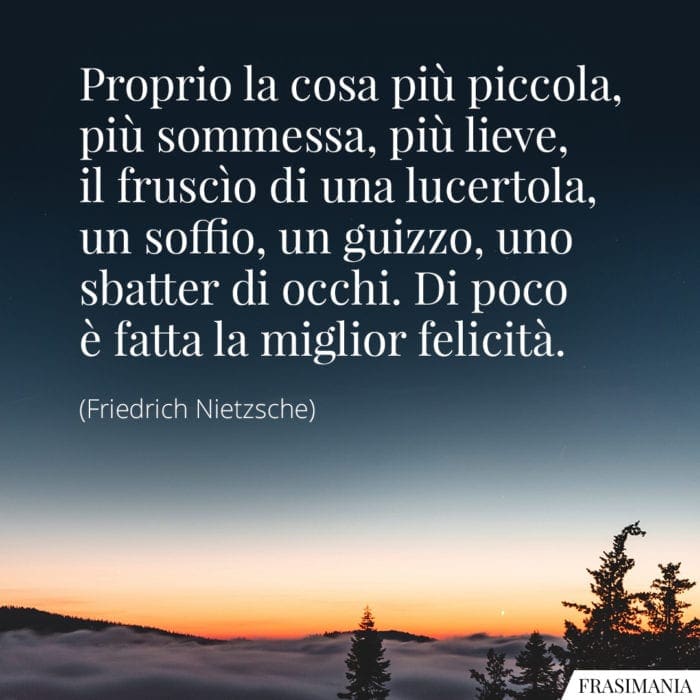
- True happiness is to enjoy the present, without anxious dependence upon the future.
La vera felicità è godersi il presente senza dipendere ansiosamente dal futuro.
(Lucio Anneo Seneca) - Joy is prayer; joy is strength: joy is love; joy is a net of love by which you can catch souls.
La gioia è preghiera; la gioia è forza: la gioia è amore; la gioia è una rete di amore con cui puoi catturare le anime.
(Madre Teresa di Calcutta) - Happiness is a warm puppy.
La felicità è un cucciolo caldo.
(Charles M. Schulz) 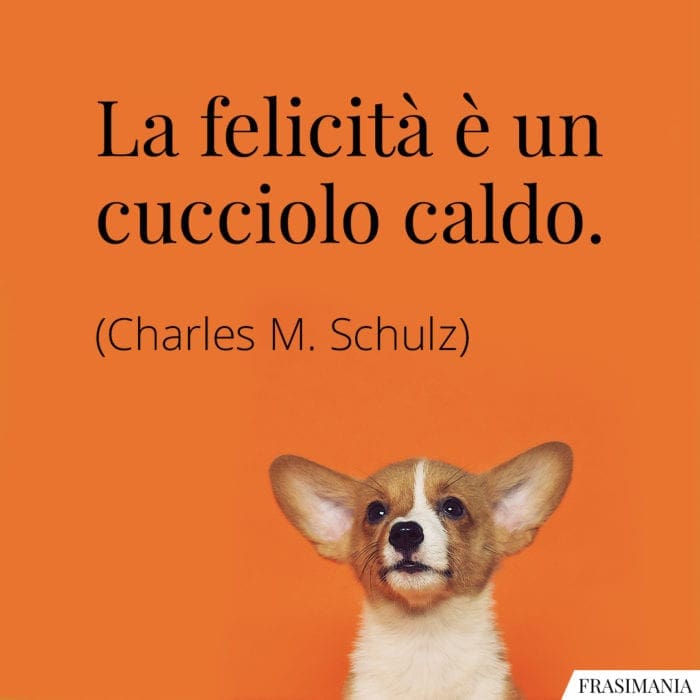
- When you jump for joy, beware that no one moves the ground from beneath your feet.
Quando salti di gioia, stai attento che nessuno ti porti via il terreno da sotto i piedi.
(Stanislaw Jerzy Lec) - Happiness can exist only in acceptance.
La felicità può esistere solo nell’accettazione.
(George Orwell) - If you want to be happy, be.
Se vuoi essere felice, sii felice.
(Lev Tolstoj) 
- No man is happy without a delusion of some kind. Delusions are as necessary to our happiness as realities.
Nessuno è felice senza avere un’illusione, le illusioni sono necessarie alla nostra felicità quanto le cose reali.
(Christian Nestell Bovee) - Happiness depends upon ourselves.
La felicità dipende da noi stessi.
(Aristotele) - Everyone is trying to accomplish something big, not realizing that life is made up of little things.
Tutti cercano di realizzare qualcosa di grande, senza rendersi conto che la vita è fatta di piccole cose.
(Frank Clark) 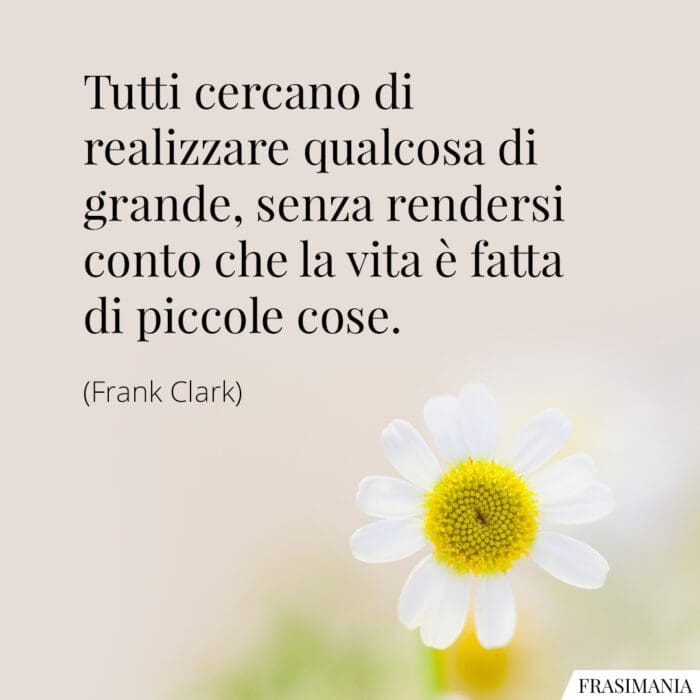
- Happiness is the only thing that doubles when you share it.
La felicità è la sola cosa che si raddoppia quando la si condivide.
(Albert Schweitzer) - Constant complaint is the poorest sort of pay for all the comforts we enjoy.
Lagnarsi sempre è il peggior modo di pagare gli agi di cui godiamo.
(Benjamin Franklin) 
- The present is never our end; the past and the present are our means, the future alone our end. Thus we never actually live, but hope to live, and since we are always planning how to be happy, it is inevitable that we should never be so.
Il presente non è mai il nostro fine; il passato e il presente sono i nostri mezzi; solo l’avvenire è il nostro fine. Così, non viviamo mai, ma speriamo di vivere, e, preparandoci sempre ad esser felici, è inevitabile che non lo saremo mai.
(Blaise Pascal) - Anyone who says sunshine bring happiness has never danced in the rain.
Chi dice che il sole porta la felicità non ha mai ballato sotto la pioggia.
(Anonimo) 
- Who is the happiest of men? He who values the merits of others, and in their pleasure takes joy, even as though t’were his own.
Chi è il più felice degli uomini? Chi apprezza i meriti degli altri, e trova gioia nel loro piacere, come se fossero suoi.
(Johann Wolfgang von Goethe) - Dream your life in colors—it’s the secret to happiness.
Sogna la tua vita a colori. È il segreto della felicità.
(Walt Disney) - Some cause happiness wherever they go; others whenever they go.
Alcuni portano felicità ovunque vadano. Altri quando se ne vanno.
(Oscar Wilde) 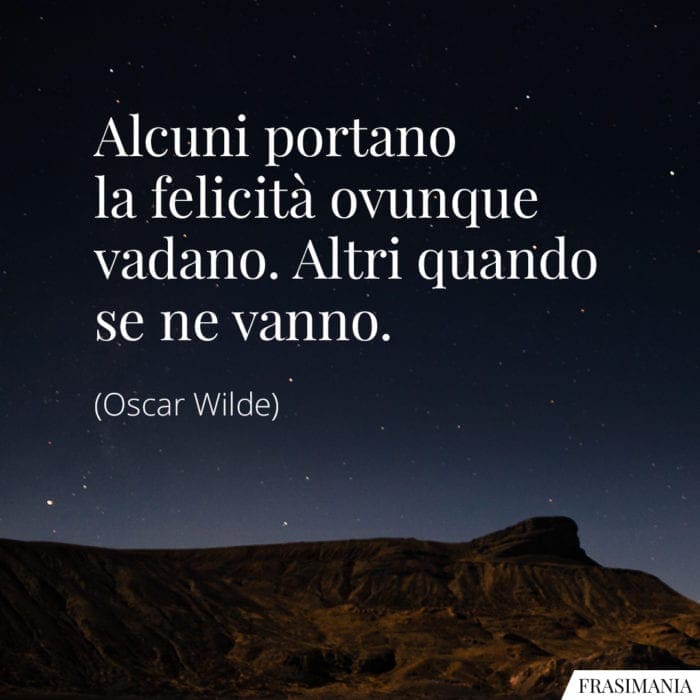
- He who kisses the joy as it flies lives in eternity’s sun rise.
Chi bacia la gioia in volo vive nell’alba dell’eternità.
(William Blake) - Being happy doesn’t mean that everything is perfect. It means that you’ve decided to look beyond the imperfections.
Essere felici non significa che tutto è perfetto. Vuol dire che hai deciso di guardare oltre le imperfezioni.
(Gerard Way) - A table, a chair, a bowl of fruit and a violin; what else does a man need to be happy?
Un tavolo, una sedia, una ciotola di frutta e un violino; di cos’altro ha bisogno un’uomo per essere felice?
(Albert Einstein) - Nothing is wrong if it makes you happy.
Niente è sbagliato se ti rende felice.
(Bob Marley) 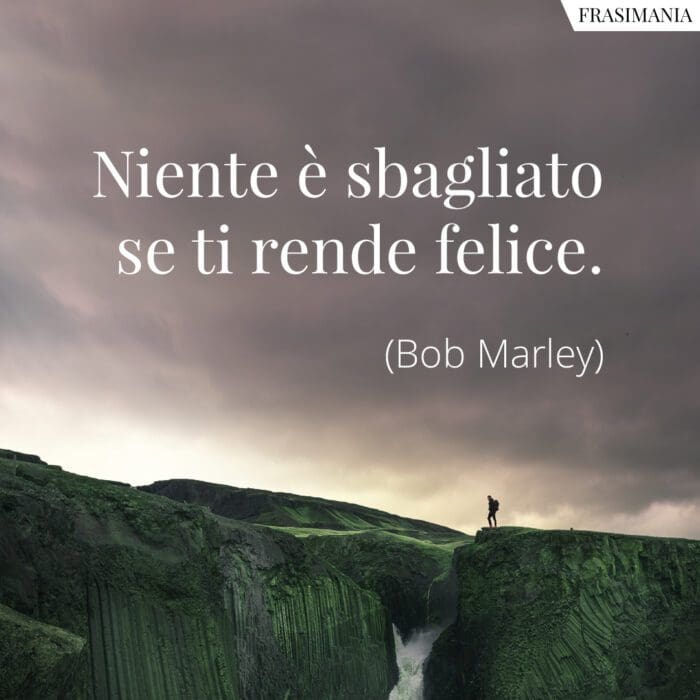
- Most folks are as happy as they make up their minds to be.
La maggior parte delle persone è felice nella misura in cui ha deciso di esserlo.
(Abraham Lincoln) - If you’re not having fun, you’re doing something wrong.
Se non ti stai divertendo, stai sbagliando qualcosa.
(Groucho Marx) - You can not be unhappy when you have this: the smell of the sea, the sand beneath your fingers, the air, the wind.
Non si può essere infelici quando si ha questo: l’odore del mare, la sabbia sotto le dita, l’aria, il vento.
(Irène Némirovsky) 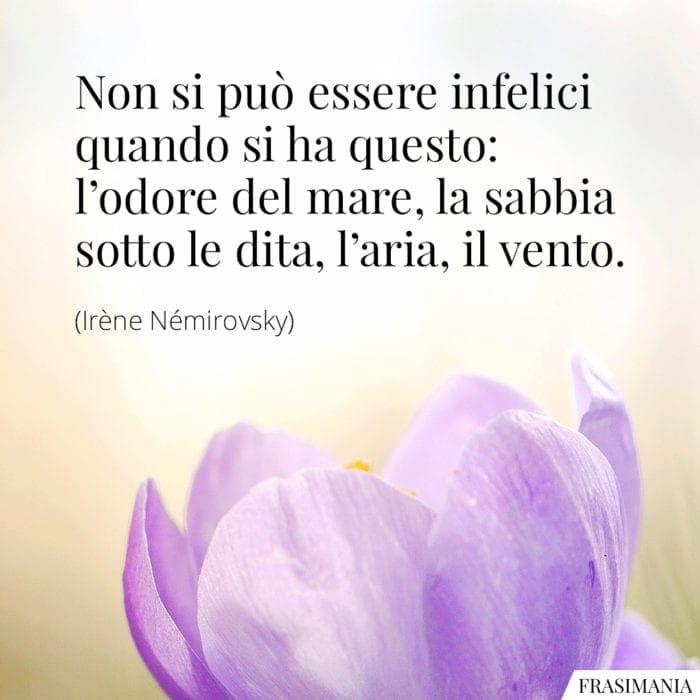
- The secret to happiness is to face the fact that the world is horrible.
Il segreto della felicità sta nell’affrontare il fatto che il mondo sia orribile.
(Bertrand Russell) - The word progress has no meaning as long as unhappy children exist.
La parola “progresso” non significherà mai niente finché ci saranno bambini infelici.
(Albert Einstein) 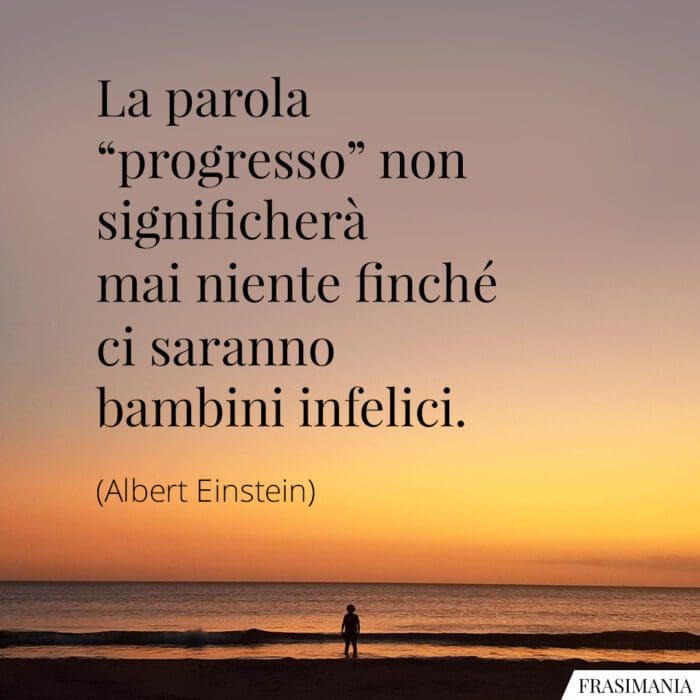
- Happy men are grave. They carry their happiness cautiously, as they would a glass filled to the brim which the slightest movement could cause to spill over, or break.
Le persone felici sono serie. Portano la loro felicità con cautela, come se fosse un bicchiere pieno che il minimo movimento può far traboccare o rompere.
(Jules Barbey d’Aurevilly) - Happiness is not a goal… it’s a by-product of a life well lived.
La felicità non è un obiettivo, è il risultato di una vita ben vissuta.
(Eleanor Roosevelt) 
- Happiness is composed of misfortunes avoided.
La felicità è fatta di sventure evitate.
(Alphonse Karr) - When we are happy, we are always good, but when we are good, we are not always happy.
Quando siamo felici, siamo sempre buoni, ma quando siamo buoni, non siamo sempre felici.
(Oscar Wilde) - The most important thing is to enjoy your life – to be happy – it’s all that matters.
La cosa più importante è godersi la vita. Essere felici è tutto ciò che conta.
(Audrey Hepburn) 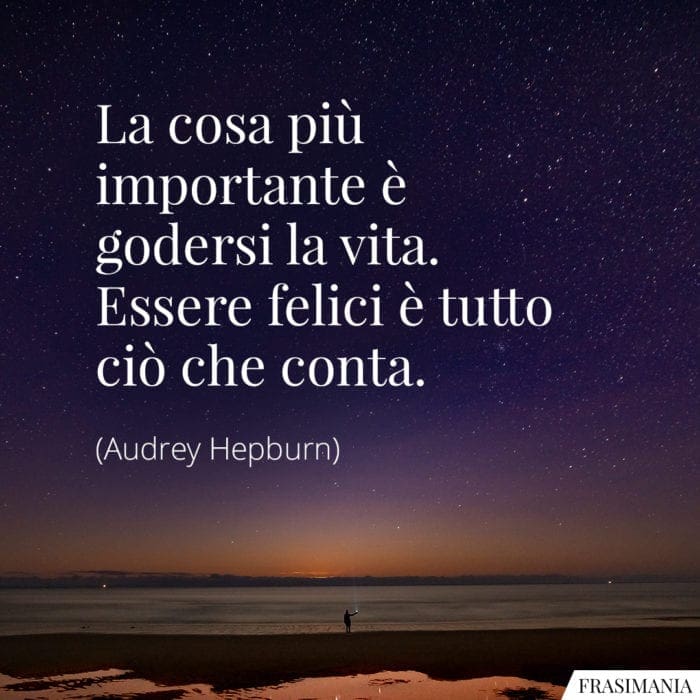
- It’s part of life to have obstacles. It’s about overcoming obstacles; that’s the key to happiness.
Avere ostacoli fa parte della vita. Si tratta di superare gli ostacoli; questa è la chiave della felicità.
(Herbie Hancock) - A man can be happy with any woman, as long as he does not love her.
Un uomo può essere felice con qualsiasi donna, purché non la ami.
(Oscar Wilde) 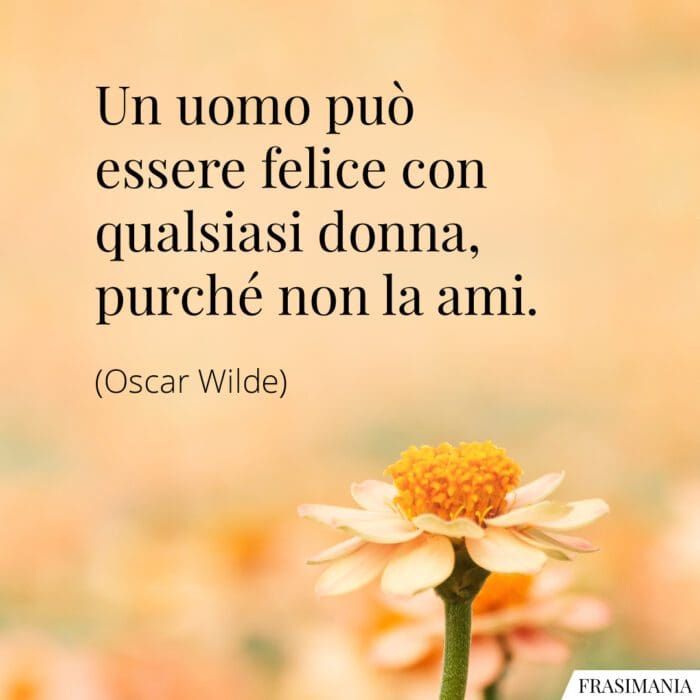
- I decided to be happy. I heard it’s good for your health.
Ho deciso di essere felice. Ho sentito che fa bene alla salute.
(Voltaire) - The two enemies of human happiness are pain and boredom.
I due nemici della felicità umana sono il dolore e la noia.
(Arthur Schopenhauer) - For every minute you are angry you lose sixty seconds of happiness.
Per ogni minuto che passi arrabbiato perdi sessanta secondi di felicità.
(Ralph Waldo Emerson) 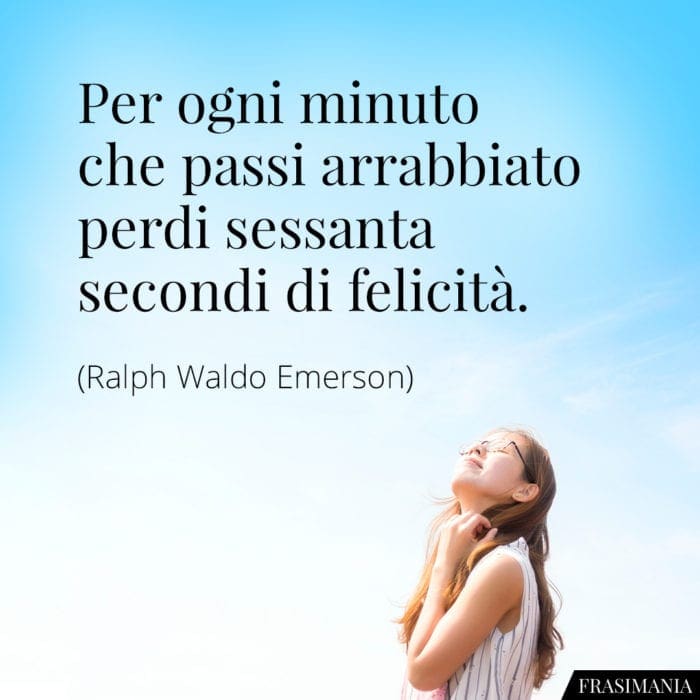
- There is no way to happiness – happiness is the way.
Non c’è una via verso la felicità: la felicità è la via.
(Thich Nhat Hanh) - Don’t ask yourself what the world needs. Ask yourself what makes you come alive and then go do that. Because what the world needs is people who have come alive.
Non chiederti di cosa ha bisogno il mondo. Chiediti che cosa ti rende felice e poi fallo. Il mondo ha solo bisogno di persone felici.
(Antoine De Saint-Exupéry) 
- Happiness in intelligent people is the rarest thing I know.
La felicità nelle persone intelligenti è la cosa più rara che io conosca.
(Ernest Hemingway) - There is only one way to happiness and that is to cease worrying about things which are beyond the power of our will.
C’è solo una via per la felicità e questo è cessare di preoccuparsi di cose che sono al di là del potere della nostra volontà.
(Epitteto) - Before we set our hearts too much upon anything, let us examine how happy they are, who already possess it.
Prima di desiderare fortemente una cosa, bisogna verificare quanto sia felice chi la possiede.
(François de La Rochefoucauld) 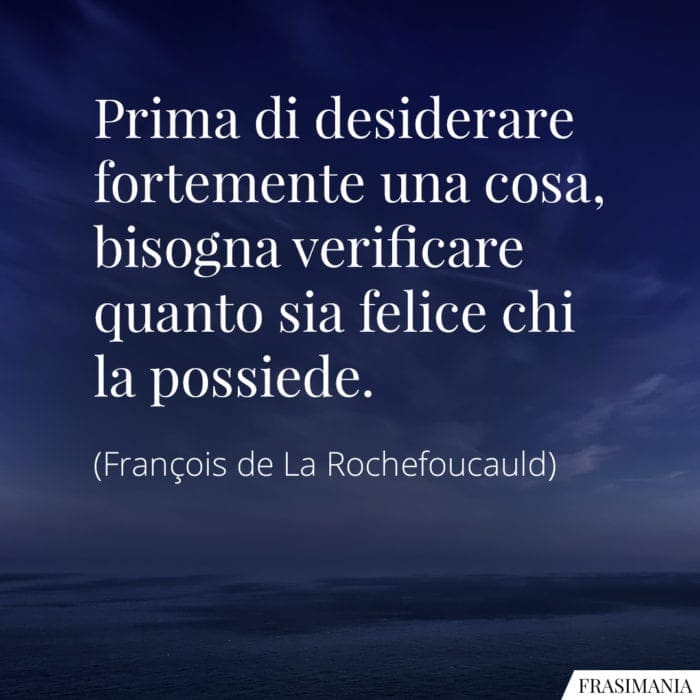
- The secret of happiness is not found in seeking more, but in developing the capacity to enjoy less.
Il segreto della felicità non risiede nel desiderare di più, ma nello sviluppare la capacità di gioire del meno.
(Socrate) - The greatest happiness is to know the source of unhappiness.
La più grande felicità è conoscere la fonte dell’infelicità.
(Fyodor Dostoevsky) - Happiness is a journey, not a destination.
La felicità è un percorso, non una destinazione.
(Madre Teresa di Calcutta) 
- The man who makes everything that leads to happiness depends upon himself, and not upon other men, has adopted the very best plan for living happily. This is the man of moderation, the man of manly character and of wisdom.
L’uomo che fa tutto ciò che porta alla felicità dipende da se stesso, e non dagli altri uomini, ha adottato il miglior piano per vivere felicemente. Questo è l’uomo di moderazione, l’uomo saggio e dal carattere virile.
(Platone) - Joy can only be real if people look upon their life as a service and have a definite object in life outside themselves and their personal happiness.
La felicità può essere reale solo se le persone considerano la loro vita come un mezzo e hanno un obiettivo definito al di fuori di se stessi e del loro appagamento personale.
(Lev Tolstoj) - With freedom, books, flowers, and the moon, who could not be happy?
Con la libertà, i libri, i fiori e la luna, chi non potrebbe essere felice?
(Oscar Wilde) 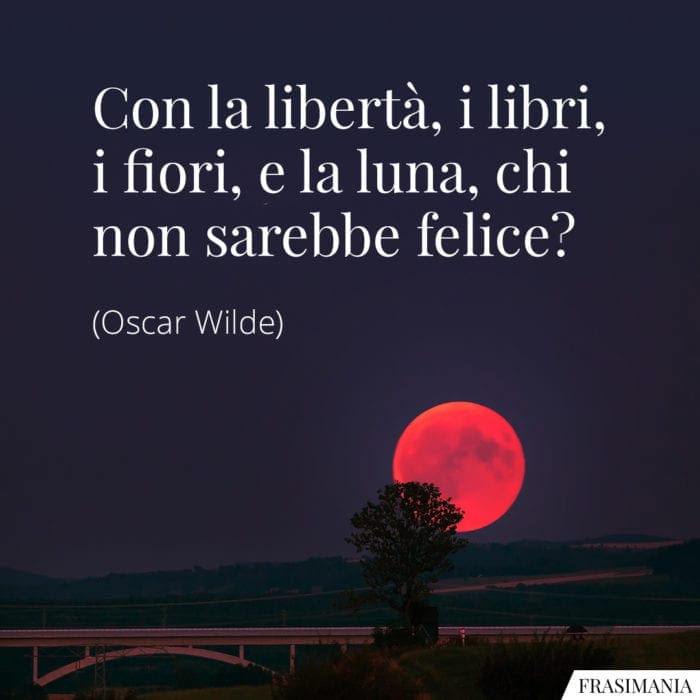
- A flower blossoms for its own joy.
Un fiore sboccia per la sua stessa gioia.
(Oscar Wilde) - Everyone you meet always asks if you have a career, are married, or own a house as if life was some kind of grocery list. But no one ever asks you if you are happy.
Tutti quelli che incontri ti chiedono sempre se hai un lavoro, se sei sposato o se possiedi una casa, come se la vita fosse una specie di lista della spesa. Ma nessuno ti chiede mai se sei felice.
(Heath Ledger) 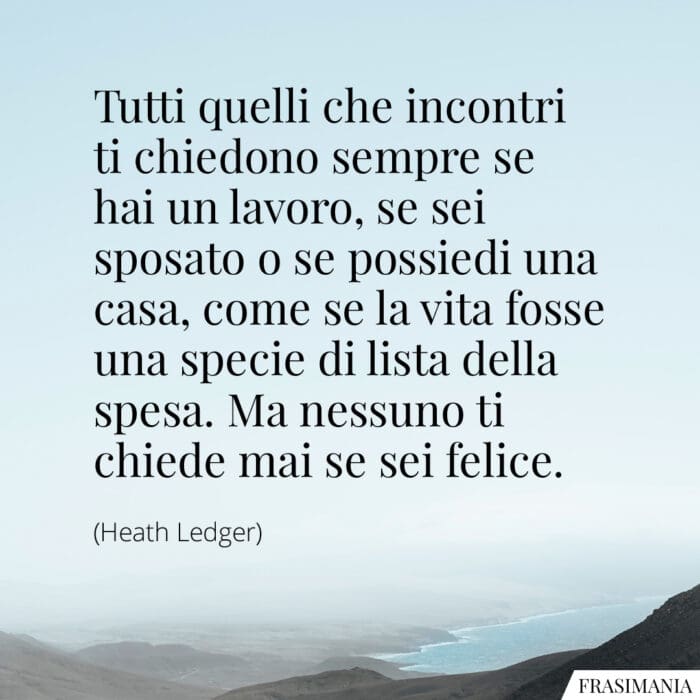
- The safest way of not being very miserable is not to expect to be very happy.
Per non diventare molto infelici il mezzo più sicuro sta nel non pretendere di essere molto felici.
(Arthur Schopenhauer) - Many people lose the small joys in the hope for the big happiness.
Molte persone si perdono le piccole gioie nella speranza della grande felicità.
(Pearl S. Buck) 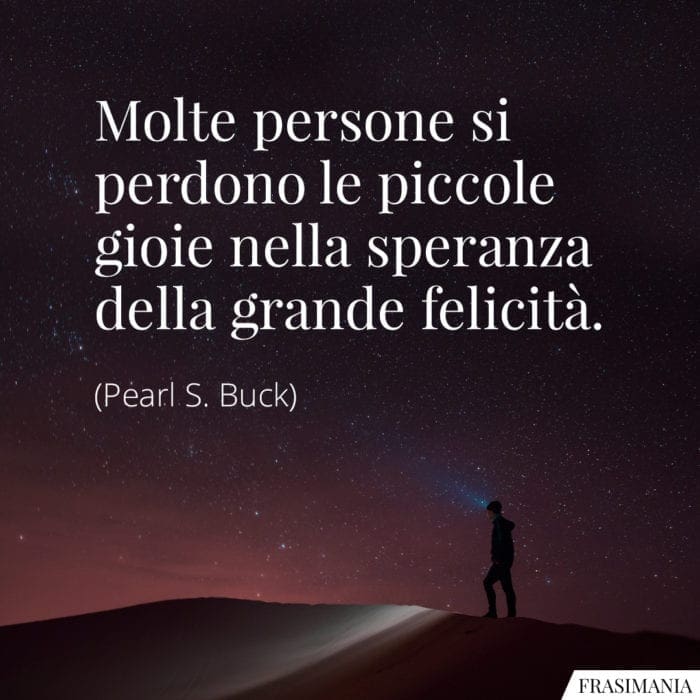
- Which of us is happy in this world? Which of us has his desire? or, having it, is satisfied?
Chi di noi è felice in questo mondo? Chi ha dei desideri o chi, avendoli soddisfatti, si sente pago?
(William Makepeace Thackeray) - Good memories are our second chance at happiness.
I bei ricordi sono la nostra seconda possibilità per essere felici.
(Elisabetta II del Regno Unito) 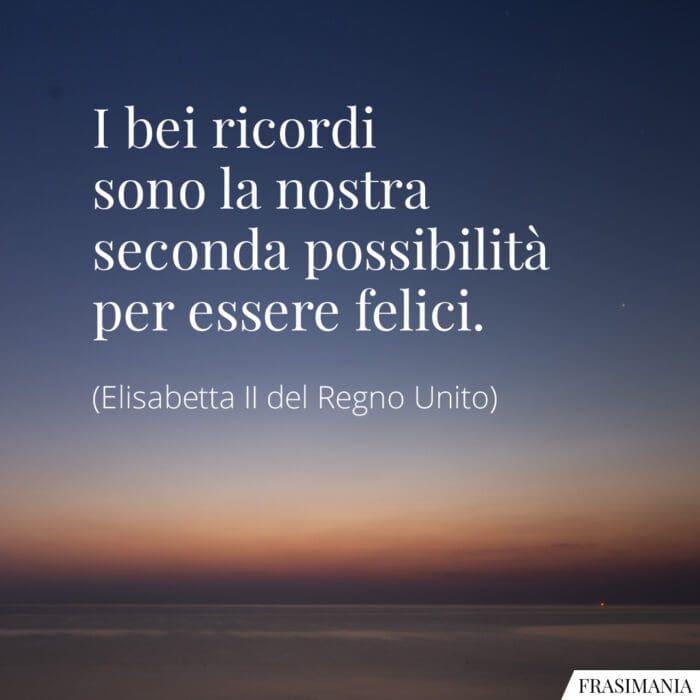
- I had a moment of great peace. Maybe this is happiness.
Ho avuto un istante di grande pace. Forse è questa la felicità.
(Virginia Woolf) - Everyone wants to live on top of the mountain, but all the happiness and growth occurs while you’re climbing it.
Tutti vogliono vivere in cima alla montagna, ma la felicità e la crescita si trovano nel cammino per scalarla.
(Confucio) 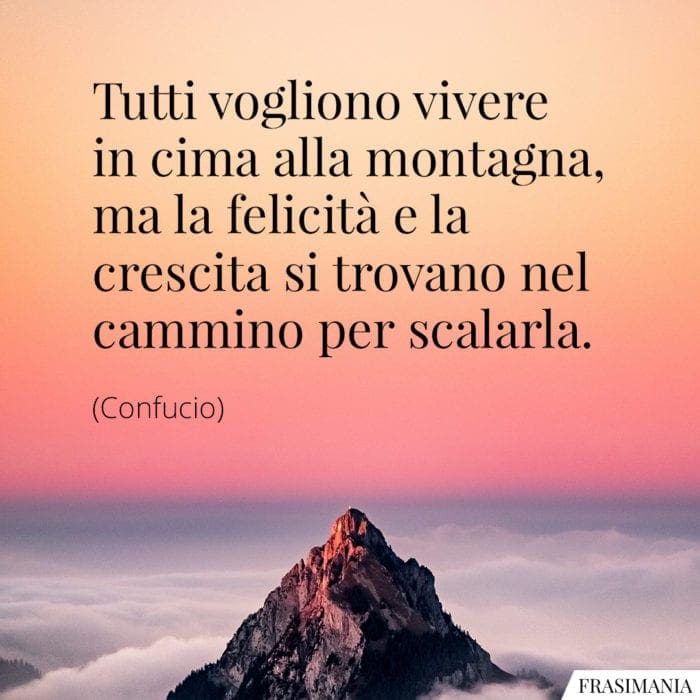
- Your first duty is to make yourself happy. If you are happy, you can make others happy, too.
Il tuo dovere primario è far felice te stesso. Se sei felice, farai felici anche gli altri.
(Ludwig Feuerbach) - Man is unhappy because he doesn’t know he’s happy. If anyone finds out he’ll become happy at once.
L’uomo è infelice perché non sa di essere felice. Se qualcuno lo scopre che diventerà felice in un attimo.
(Fyodor Dostoevsky) - Whoever said money can’t buy happiness didn’t know where to shop.
Chiunque abbia detto che i soldi non possono comprare la felicità non sapeva dove fare acquisti.
(Gertrude Stein) 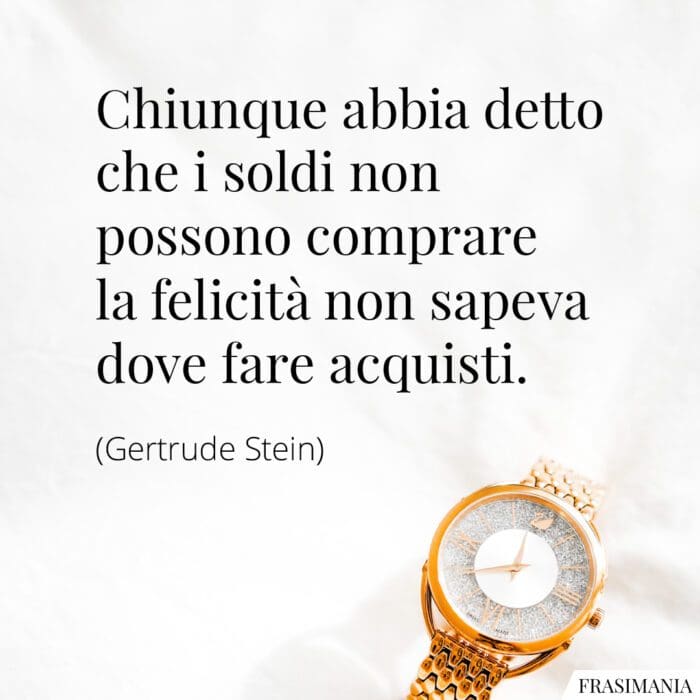
- If you want others to be happy, practice compassion. If you want to be happy, practice compassion.
Se vuoi che gli altri siano felici, pratica la compassione. Se vuoi essere felice tu, pratica la compassione.
(Dalai Lama) - Life should be blissful, and blissful doesn’t mean just a small happiness. It’s huge. It is profound.
La vita dovrebbe essere felice, e la beatitudine non significa solo una piccola felicità. È enorme. È profondo.
(David Lynch) - To get the full value of joy you must have someone to divide it with.
Per cogliere tutto il valore della felicità devi avere qualcuno con cui condividerla.
(Mark Twain) 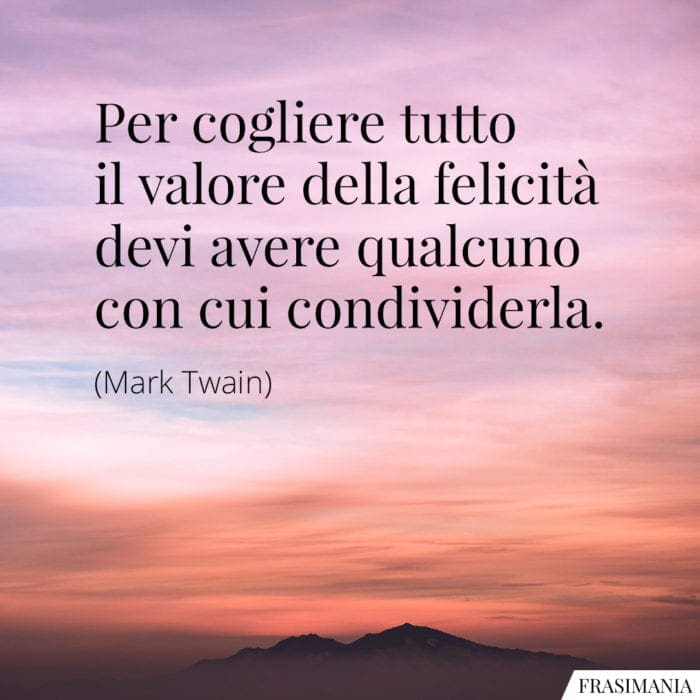
- Happiness is a state of mind. It’s just according to the way you look at things.
La felicità è uno stato mentale. Dipende solo dal modo in cui guardi le cose.
(Walt Disney) - I had a moment of great peace. Maybe this is happiness.
Ho avuto un istante di grande pace. Forse è questa la felicità.
(Virginia Woolf) 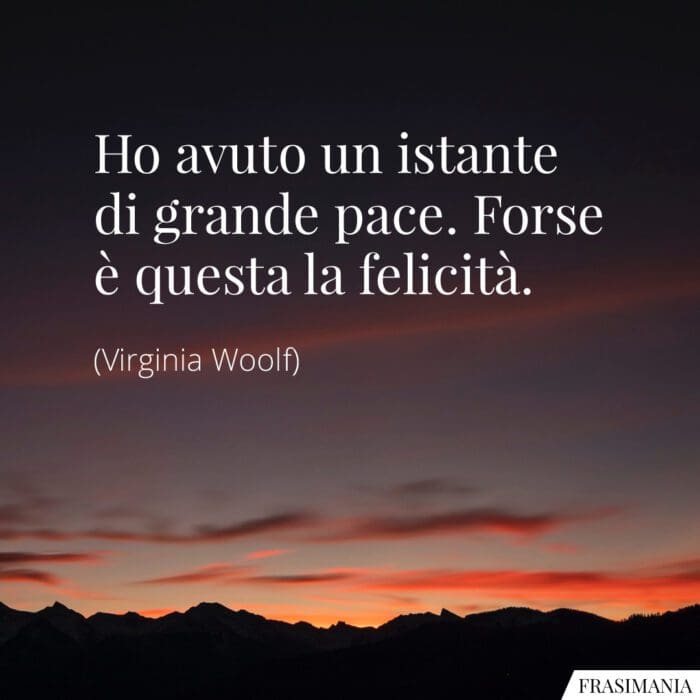
- There is no light without shadow, just as there is no happiness without pain.
Non c’è luce senza ombra, così come non c’è felicità senza dolore.
(Isabel Allende) - Happiness does not come from without, it comes from within.
La felicità non viene da fuori, ma da dentro.
(Helen Keller) - Happiness often sneaks in through a door you didn’t know you left open.
La felicità spesso si insinua attraverso una porta che non sapevi di aver lasciato aperta.
(John Barrymore) 
- But what is happiness except the simple harmony between a man and the life he leads?
Ma cos’è la felicità se non la semplice armonia tra un uomo e la vita che conduce?
(Albert Camus) - If you want to live a happy life, tie it to a goal, not to people or objects.
Se vuoi vivere una vita felice, legala ad un obiettivo, non alle persone o agli oggetti.
(Albert Einstein) - Happiness grows at our own firesides, and is not to be picked in strangers’ gardens.
La felicità è a casa tua, non cercarla nel giardino degli altri.
(Douglas Jerrold) 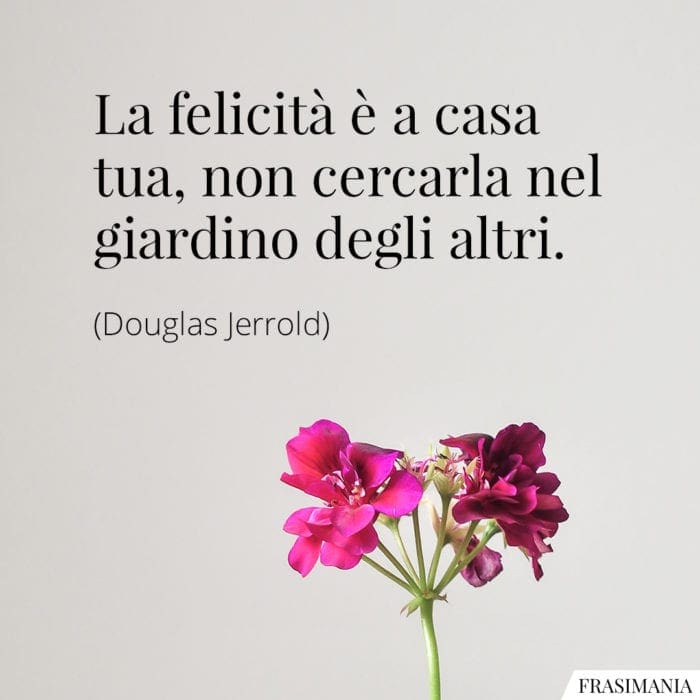
- Pleasure can be supported by an illusion; but happiness rests upon truth.
Il piacere può essere sostenuto da un’illusione; ma la felicità si basa sulla verità.
(Sébastien-Roch Nicolas de Chamfort) - The happiness or unhappiness of men depends no less upon their dispositions than their fortunes.
La felicità e l’infelicità degli uomini dipendono tanto dal loro stato d’animo quanto dalla fortuna.
(François de La Rochefoucauld) - The world is so totally and wonderfully meaningless that being happy is not luck: it is pure art.
Il mondo è così totalmente e meravigliosamente privo di senso che riuscire a essere felici non è fortuna: è arte allo stato puro.
(René Magritte) 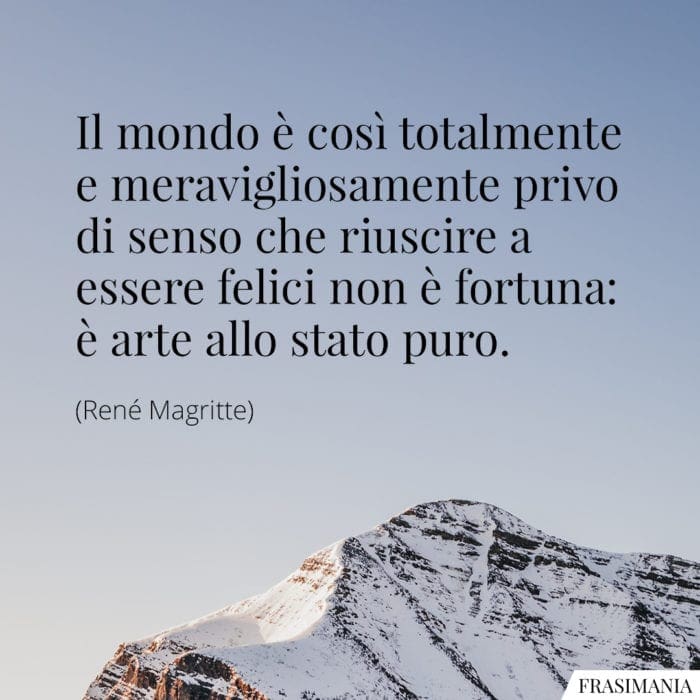
- We all want to help one another. Human beings are like that. We want to live by each other’s happiness, not by each other’s misery.
Vogliamo tutti aiutarci l’un l’altro. Gli esseri umani sono così. Vogliamo vivere la felicità l’uno dell’altro, non dalla miseria degli altri.
(Charlie Chaplin) - It took me a lifetime to learn that happiness is in quiet things, not the peaks of ecstasy.
Mi ci è voluta una vita per imparare che la felicità è nelle cose tranquille, non nelle vette dell’estasi.
(Anaïs Nin) 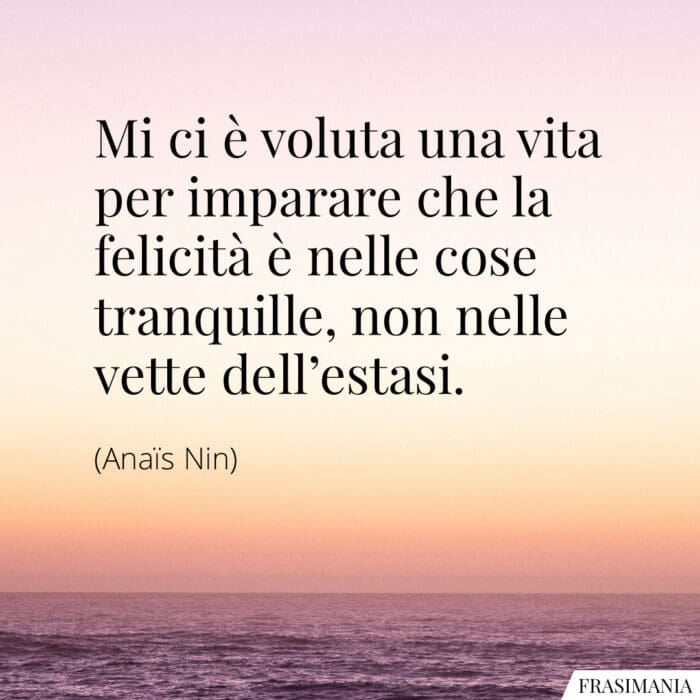
- One of the first conditions of happiness is that the link between Man and Nature shall not be broken.
Una delle prime condizioni di felicità è che il legame tra l’uomo e la natura non si rompa.
(Lev Tolstoj) - Life is full of happiness and tears; be strong and have faith.
La vita è piena di felicità e lacrime; sii forte e abbi fede.
(Kareena Kapoor Khan) 
- Men can only be happy when they do not assume that the object of life is happiness.
Gli uomini possono essere felici solo quando non credono che lo scopo della vita sia la felicità.
(George Orwell) - Pleasure is the only thing to live for. Nothing ages like happiness.
Il piacere è l’unica cosa degna di essere vissuta. Niente fa invecchiare quanto la felicità.
(Oscar Wilde) - It takes courage to be happy.
Per essere felici ci vuole coraggio.
(Karen Blixen) 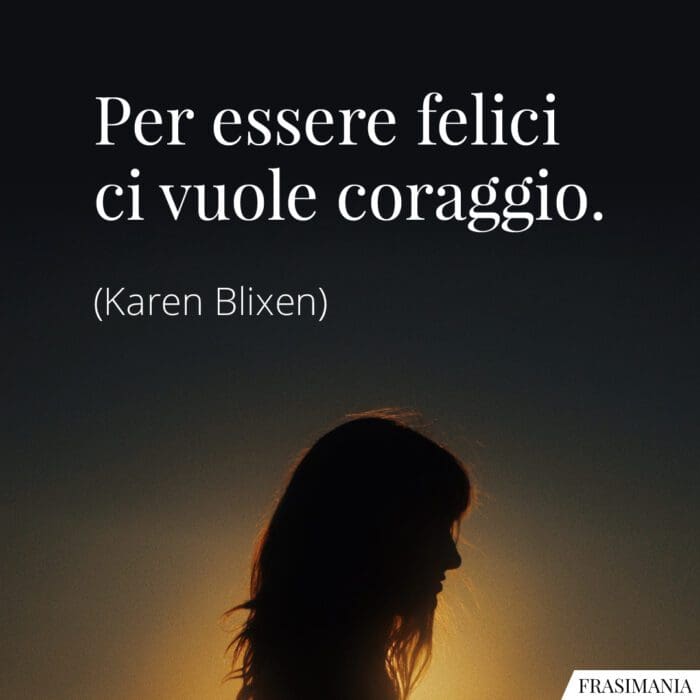
- Happiness, not in another place but this place…not for another hour, but this hour.
Felicità, non in un altro posto ma in questo posto… non per un’altra ora, ma per quest’ora.
(Walt Whitman) - They must often change, who would be constant in happiness or wisdom.
Devono spesso cambiare, chi sarebbe costante nella felicità o nella saggezza.
(Confucio) - Perfect happiness – something very near to sadness.
La vera felicità è qualcosa di molto vicino alla tristezza.
(Charlie Chaplin) 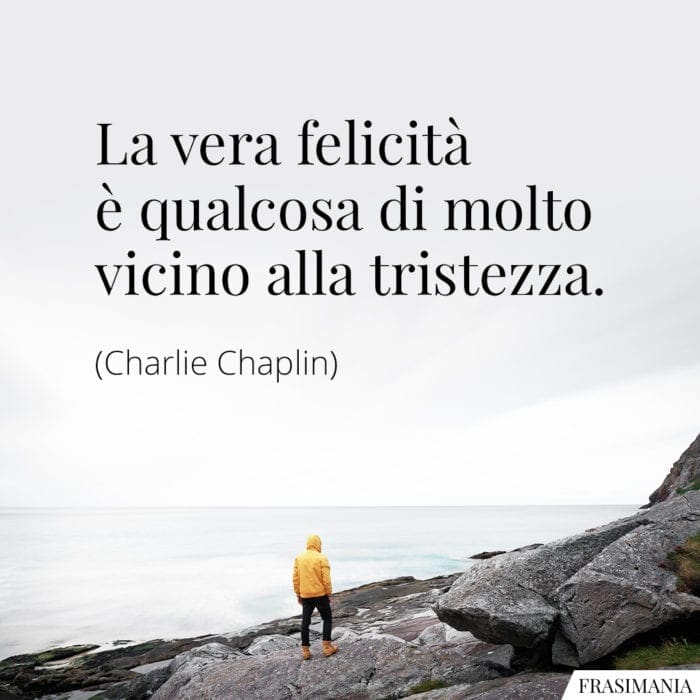
- The first requisite for the happiness of the people is the abolition of religion.
Il primo requisito per la felicità del popolo è l’abolizione della religione.
(Karl Marx) - Happiness is a perfume you cannot pour on others without getting a few drops on yourself.
La felicità è un profumo che non puoi versare sugli altri senza che te ne cada addosso qualche goccia.
(Ralph Waldo Emerson) - There are two ways to be happy in this life, one is to become the idiot and the other is to be.
Esistono due modi per essere felici in questa vita, uno è di diventare un idiota e l’altro è di esserlo.
(Sigmund Freud) 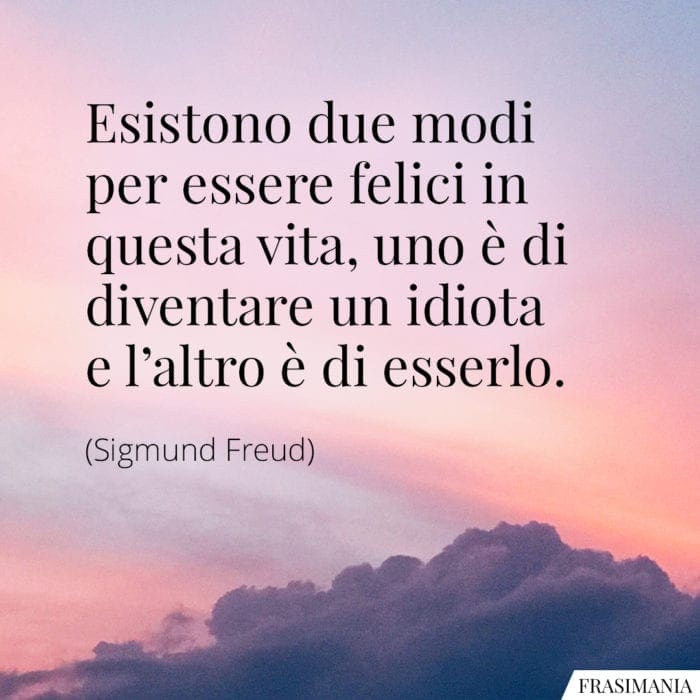
- Rules for happiness: something to do, someone to love, something to hope for.
I tre elementi essenziali per la felicità: qualcosa da fare, qualcosa da amare, qualcosa da sperare.
(Emmanuel Kant) - The greatest happiness is to transform one’s feelings into action.
La più grande felicità sta nel trasformare i sentimenti in azioni.
(Madame de Staël) - Dreaming is happiness. Waiting is life.
Sognare è la felicità. Aspettare è la vita.
(Victor Hugo) 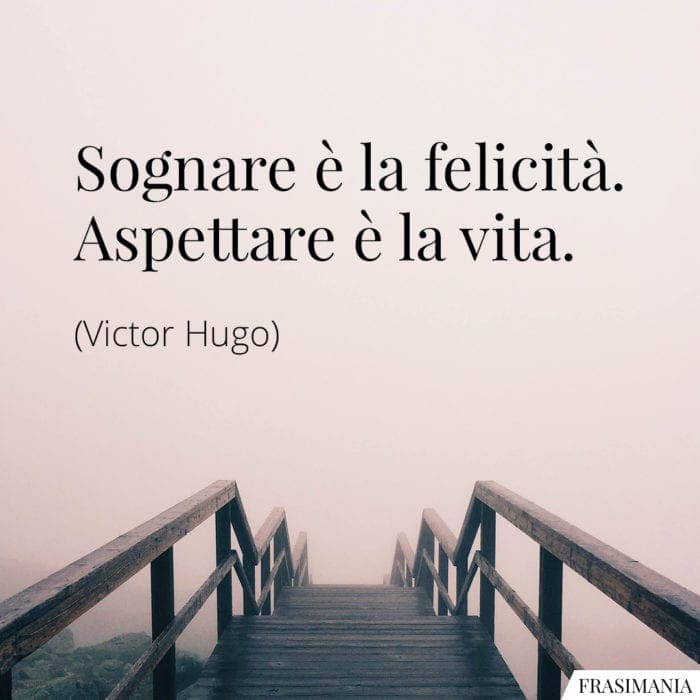
- Human happiness and moral duty are inseparably connected.
Felicità e dovere morale sono inseparabilmente connessi.
(George Washington) - Few people can be happy unless they hate some other person, nation, or creed.
Poche persone riescono a essere felici senza odiare qualche altra persona, nazione o credo.
(Bertrand Russell) - Happiness hates the timid.
La felicità odia i timidi.
(Eugene O’Neill) 
- Happiness is your own treasure because it lies within you.
La felicità è il tuo tesoro perché giace dentro di te.
(Prem Rawat) - I’m really afraid to feel happy because it never lasts.
Ho davvero paura di sentirmi felice perché la felicità non dura.
(Andy Warhol) - Happiness is not easy to find. It’s very difficult to find it in yourself – and impossible to find anywhere else.
Non è facile trovare la felicità dentro di noi, ma è impossibile trovarla in qualsiasi altro posto.
(Sébastien-Roch Nicolas de Chamfort) 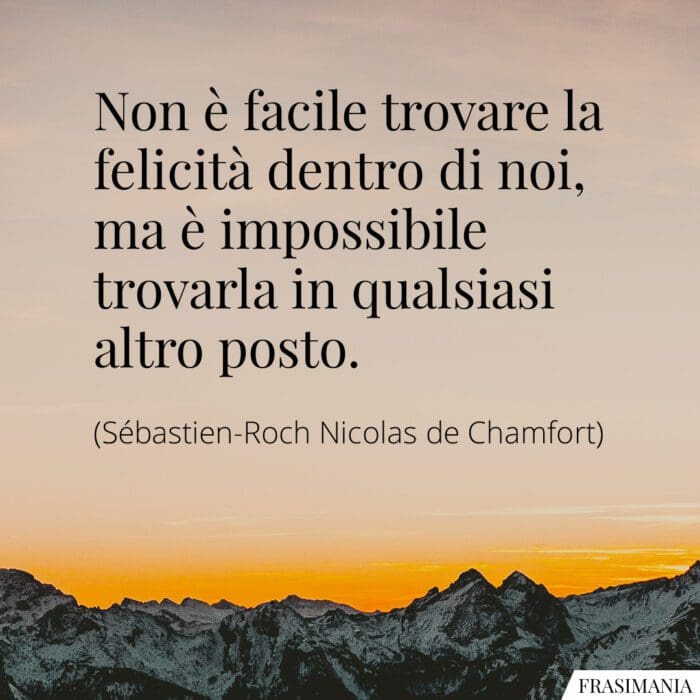
- And hope to joy is little less in joy.
La speranza di una gioia è quasi uguale alla gioia.
(William Shakespeare) - Real happiness is cheap enough, yet how dearly we pay for its counterfeit.
La vera felicità costa poco, ma paghiamo caro la sua contraffazione.
(Hosea Ballou) - It is not how much we have, but how much we enjoy, that makes happiness.
Non è quanto abbiamo, ma quanto lo apprezziamo, a renderci felici.
(Charles Spurgeon) 
- Money can’t buy you happiness but it does bring you a more pleasant form of misery.
Il denaro non può comprarti la felicità, ma ti porta una forma più piacevole di sofferenza.
(Spike Milligan) - Happiness is made of emotions on your toes.
La felicità è fatta di emozioni in punta di piedi.
(Richard Bach) - Only the development of compassion and understanding for others can bring us the tranquility and happiness we all seek.
Solo la compassione e la comprensione degli altri può portarci la tranquillità e la felicità che tutti cerchiamo.
(Dalai Lama) 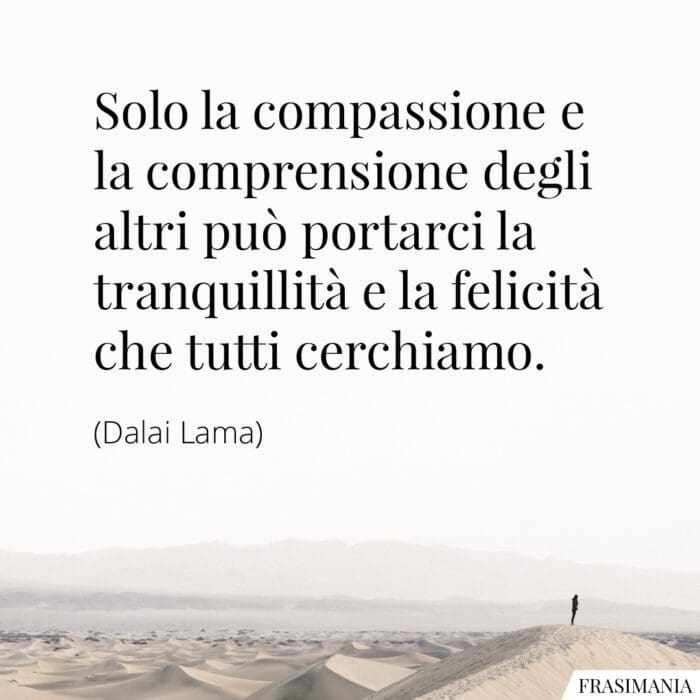
- Happiness is like the mountain summit. It is sometimes hidden by clouds, but we know it is there.
La felicità è come la vetta di una montagna: a volte è nascosta dalle nuvole, ma sappiamo che è lì.
(Helen Keller) - Money can’t buy happiness.
Il denaro non può comprare la felicità.
(Howard Hughes) - You will see great sorrow, and in that sorrow you will be happy. This is my last message to you: in sorrow seek happiness.
Immenso sarà il dolore che apparirà ai tuoi occhi, e in questo dolore sarai felice. Ecco la consegna che ti do: nel dolore cerca la felicità.
(Fëdor Dostoevskij) 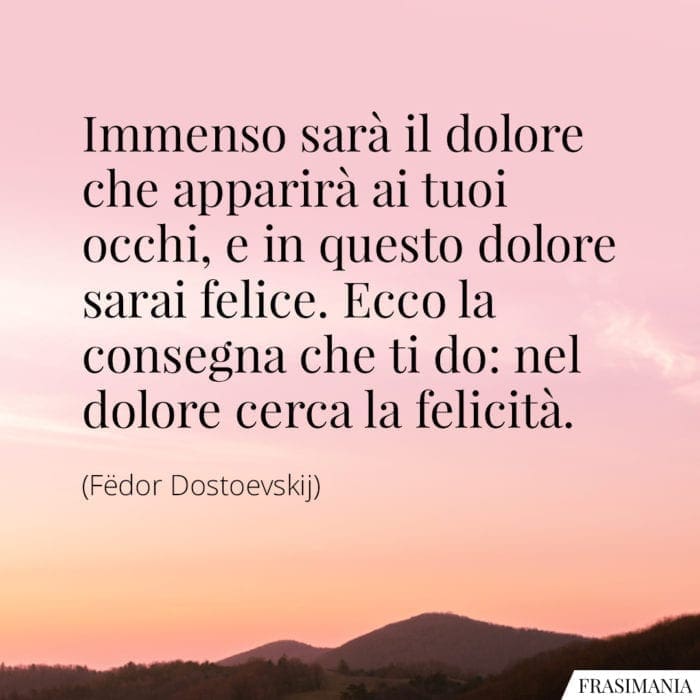
- To be without some of the things you want is an indispensable part of happiness.
La mancanza di qualcosa che si desidera è una parte indispensabile della felicità.
(Bertrand Russell) - Everyone chases after happiness, not noticing that happiness is right at their heels.
Tutti inseguono la felicità, senza accorgersi che la felicità è proprio alle loro calcagna.
(Bertolt Brecht) - Being miserable is a habit. Being happy is a habit. The choice is yours.
Essere infelici è un’abitudine. Essere felici è un’abitudine. La scelta spetta a te.
(Tom Hopkins) 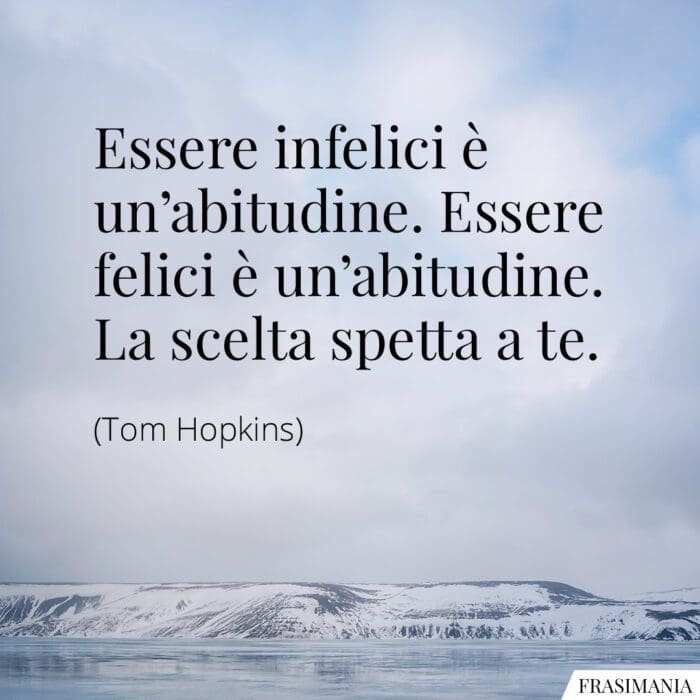
- Happiness is a shadow which instantly vanishes from the grasp.
La felicità è un’ombra che svanisce nell’istante in cui la si afferra.
(Sofocle) - The best way to cheer yourself up is to try to cheer somebody else up.
Il miglior modo per stare allegri è cercare di rallegrare qualcun altro.
(Mark Twain) - The happiest people aren’t necessarily those who enjoy the best of everything, but those that gain the best of wht they have.
Le persone più felici non sono necessariamente coloro che hanno il meglio di tutto, ma coloro che traggono il meglio da ciò che hanno.
(Khalil Gibran) 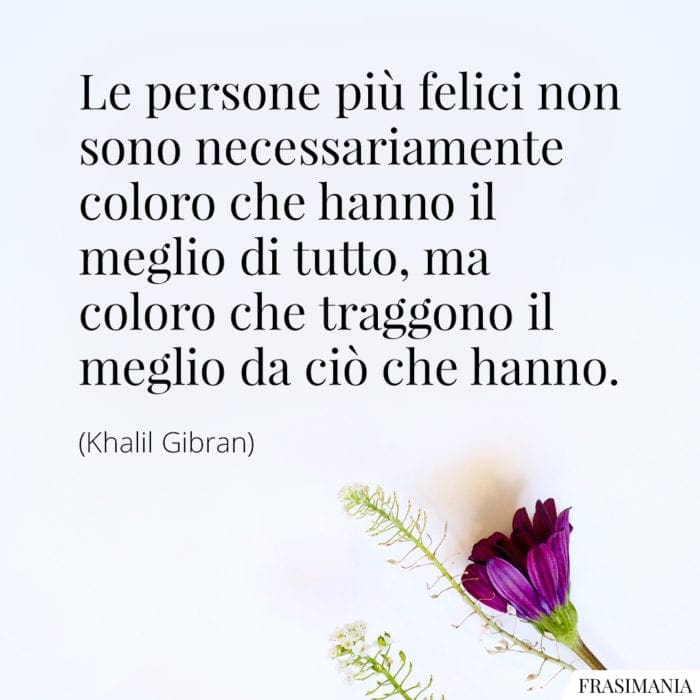
- Happiness is making your dreams come true.
La felicità è far avverare i tuoi sogni.
(Jourdan Dunn) - A happy man is too satisfied with the present to dwell too much on the future.
Un uomo felice è troppo soddisfatto del presente per soffermarsi troppo sul futuro.
(Albert Einstein) - Happiness is a butterfly, which when pursued, is always just beyond your grasp, but which, if you will sit down quietly, may alight upon you.
La felicità è una farfalla che, quando inseguita, è sempre appena al di là della tua portata, ma che, se ti siedi in silenzio, può posarsi su di te.
(Nathaniel Hawthorne) 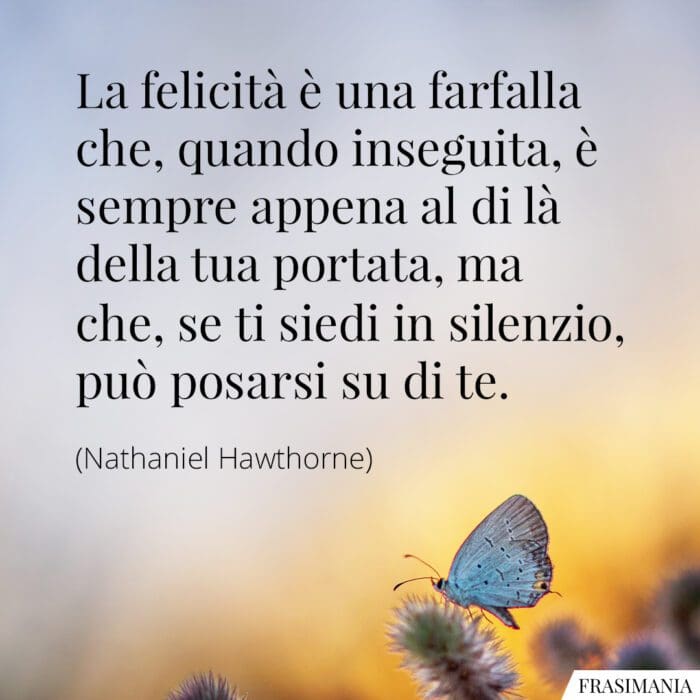
- Seek happiness in tranquility and avoid ambition even if it be only the apparently innocent one of distinguishing yourself in science and discoveries.
Cerca la felicità nella tranquillità ed evita l’ambizione anche se si tratta di quella, apparentemente innocente, di distinguersi nella scienza e nelle scoperte.
(Mary Shelley) - I am happy because I want nothing from anyone. I do not care for money. Decorations, titles or distinctions mean nothing to me. I do not crave praise. The only thing that gives me pleasure, apart from my work, my violin and my sailboat, is the appreciation of my fellow workers.
Sono felice perché non voglio niente da nessuno. Non mi interessano i soldi. Decorazioni, titoli o distinzioni non significano nulla per me. Non bramo lodi. L’unica cosa che mi dà piacere, a parte il mio lavoro, il mio violino e la mia barca a vela, è l’apprezzamento dei miei colleghi di lavoro.
(Albert Einstein) - You will never be happy if you continue to search for what happiness consists of. You will never live if you are looking for the meaning of life.
Non sarai mai felice se continui a cercare in che cosa consista la felicità. Non vivrai mai se stai cercando il significato della vita.
(Albert Camus) - When ambition ends, happiness begins.
Quando finisce l’ambizione, inizia la felicità.
(Thomas Merton)




